Golden Age of CC
Review by Brian Almeida
The Games of the World Correspondence Chess Championships 1-X, edited by Tim Harding, Batsford 1987, Hardcover (large format with dust jacket), 246pp. $36.95 (ChessCafe Price $31.27)
The precursor to today’s International Correspondence Chess Federation (ICCF) was the International Correspondence Chess Union (IFSB). It was the IFSB (Internationaler Fernschachbund), founded in 1928, that first discussed the creation of a World Correspondence Chess Championship in 1936, and none other than Alexander Alekhine was recruited to propose the idea at an IFSB conference. Among those present at the conference was Paul Keres, who along with Alekhine, also had a strong correspondence chess pedigree. However, it was not until 1937 that the resolution passed, and the outbreak of war in 1939 delayed the implementation even further. Thus, it was not until 1947 that the first World Correspondence Chess Championship began. There were seventy-seven participants from twenty-two countries who were then divided into eleven preliminary groups. The Final began in 1950 and was completed in 1953 with Cecil Purdy becoming the first Correspondence Chess Champion.
The first edition of The Games of the World Correspondence Chess Championships was published in 1979 and covered the games of the Finals 1-7. This revised edition, published in 1987, makes corrections to the original edition and adds more than 350 games from the Finals 8-10. According to the jacket cover, “This is the officially authorised record of the first ten World Correspondence Chess Championships which began in 1950. Most of these games, which represent the fruits of labour of the strongest correspondence Grandmasters ever, are only published in this thoroughly researched volume which contains virtually all of the 1,000 or so games played in ten events.”
The winners in these ten events were as follows:
- Cecil Purdy (AUS)
- Vyacheslav V. Ragozin (USSR)
- Albert O’Kelly de Galway (BEL)
- Vladimir P. Zagorovsky (USSR)
- Hans Berliner (USA)
- Horst Rittner (GDR)
- Yakov R. Estrin (USSR)
- Jorn Sloth (DEN)
- Tonu Õim (USSR)
- Vytas Victor Palciauskas (USA)
The results of the preliminary rounds leading up to the finals are included for each of the events in which they were held (there was no preliminary group for Final 3, for example), and each final is represented with a crosstable, along with notes from the editor specific to each event. For instance, this volume includes bonus games from the first final from A. Viaud who withdrew from the event and had his games canceled. Thus, his name does not appear in the crosstable, but his games that have been preserved appear at the end of the section for this event. Harding notes that “a very few games (in Finals 1, 3, and 9) appear to be irretrievably lost” and that “every effort was made to try to trace these.” There are also brief reports of the eleventh and twelfth championships, which were then just getting underway, as well as an overview of the Women’s World Correspondence Championships, including crosstables for the first three events.
The annotations to the game are light to moderate and were contributed by a number of the players or drawn from various correspondence magazines. There are about 352 diagrams in total. A complete ECO index, further divided by variation, allows ease of access to any variation and Harding has added a number of other correspondence references in the notes. A check against the ChessBase Correspondence Database shows many inconsistencies regarding results and game moves played, which just shows the historical unreliability of that medium.
Here is a brilliant game from the fifth Final 1965-68:
Estrin-Berliner
Two Knights C57
1.e4 e5 2.Nf3 Nc6 3.Bc4 Nf6 4.Ng5 d5 5.exd5 b5!? 6.Bf1 Nd4 [Fritz] 7.c3 Nxd5 8.Ne4 Qh4!? 9.Ng3 Bg4 10.f3 e4!? [TN. 10…Nf5 11.Bxb5+ Kd8 12.0-0! Bc5+ 13.d4! exd4 14.Ne4+/-] 11.cxd4 Bd6 12.Bxb5+ Kd8 13.0-0! [13.fxg4 Bxg3+ 14.hxg3 Qxh1+ 15.Bf1 Nb4 16.Nc3 Re8] 13…exf3 14.Rxf3 [14.Qb3! Estrin-Nielsen, 7/15] 14…Rb8! 15.Be2? [15.Bc6 Nb4 -/+; 15.Bf1 Re8 16.Mc3 c6! Unclear; 15.a4! Jovcic-Koshnitsky ICCF 1969] 15…Bxf3 16.Bxf3 Qxd4+ 17.Kh1 Bxg3! 18.hxg3 Rb6! 19.d3 Ne3 20.Bxe3 Qxe3 21.Bg4! h5! 22.Bh3 g5 -/+ 23.Nd2 g4 24.Nc4 Qxg3 25.Nxb6 gxh3 26.Qf3 hxg2+ 27.Qxg2 Qxg2+ 28.Kxg2 cxb6! [28…ab 29.a4 with the idea a5=.] 29.Rf1 Ke7 30.Re1+
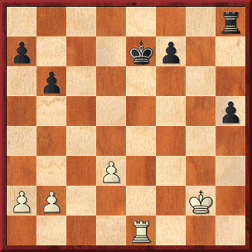
[FEN “7r/p3kp2/1p6/7p/8/3P4/PP4K1/4R3 b – – 0 30”]
And another from the tenth Final 1978-84:
Muhana-Morgado
Bird A02
1.f4 Nf6 2.e3 g6 3.b3 c5 4.Bb2 Bg7 5.g4?! Nc6 6.Bg2 d5 7.g5 Nh5 8.Nc3 [8.Bxg7!] 8…Bf5! 9.Rc1 [9.Bxd5 Nb4 10.Bxb7 Nxc2+ 11.Kf1 Nxa1] 9…d4 10.Na4 [10.Nd5 dxe3 11.Bxg7 exd2+ 12.Qxd2 Nxg7; 10.Nce2? d3; 10.exd4 cxd4; 10.Ne4 Qa5 11.Ng3 dxe3!] 10…0-0! [10…Qa5 11.c3] 11.Ne2 [11.Nxc5 dxe3! 12.dxe3? Qa5+; 11.Nf3 e5 12.fxe5 (12.Nxc5 dxe3; 12.exd4 Nxf4; 12.Ba3 exf4 13.Bxc5 Re8) 12…Nxe5 13.Nxe5 Bxe5 14.Bxb7 Qxg5; 11.Bxc6 bxc6 12.Qf3 (12.Nxc5 dxe3; 12.Nf3 Bg4) 12…dxe3 13.dxe3 Bxb2 14.Nxb2 Qa5+; 11.Qe2 e5; 11.exd4 cxd4; 11.Qf3 e5; 11.Qf3 c4!] 11…e5 [11…Bg4!? 12 Rf1 (idea Bf3) unclear.] 12.Ng3 exf4!!
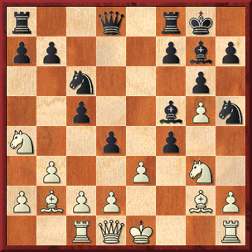
[FEN “r2q1rk1/pp3pbp/2n3p1/2p2bPn/N2p1p2/1P2P1N1/PBPP2BP/2RQK2R w K – 0 13”]
Especially noteworthy is that these games are from a time when computers were not a factor in the play and the players were on their own with regards to choosing moves. This compilation stems from a golden age of correspondence chess when the games convey a greater sense of sport and self-reliance.
Were this book being published today the reader might expect more diagrams and a little more clarity between the game moves and variations. Ostensibly, ChessCafe asked me to review this title because during the month of November it is being offered in their shop with signed bookplates from Tim Harding. The Games of the World Correspondence Chess Championships 1-X stands on its own as a wonderful compilation to own, but this extra incentive makes it all the more worthwhile.
My assessment of this book:
![]()
Order The Games of the World Correspondence Chess Championships 1-X
Edited by Tim Harding
A PDF file of this week’s review, along with all previous reviews, is available in the ChessCafe.com Archives.
© 2014 ChessEdu.org. All Rights Reserved.
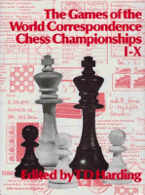

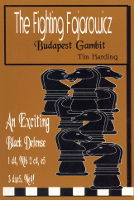
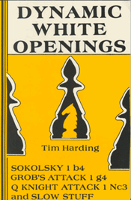
Leave a Reply